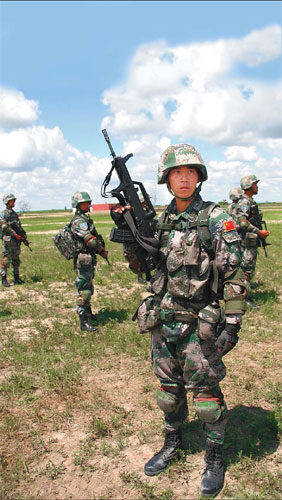As the sun continues to rise on China's military capabilities, the country's commanders are dedicated to shedding more light on its inner workings. But few would have expected its unprecedented moves into public relations this year.
 |
|
Chinese soldiers take part in a five-day joint anti-terror drill, which began on July 21, with their Russian counterparts.
|
One year after the People's Liberation Army (PLA) appointed its first ever spokesman, it will take another major step towards greater transparency with the launching of a Ministry of National Defense website on August 1.
The initiative will also mark the army's 82nd anniversary, and it is the second significant move to boost public relations announced by defense officials in a matter of months.
In March, 51 top-class officers graduated from a training camp for information officers. They were selected from the PLA's 2.3 million servicemen and women and have now been charged with the task of relaying the transparency of China's armed forces to the rest of the world.
Senior Colonel Hu Changming, 49, became the army's first ever spokesperson when he liaised with the media on the extensive relief work carried out in the wake of the May 12 earthquake in Sichuan province last year.
He led a panel of lecturers for the unique military training, sharing his experiences in handling information and dealing with the media. For his students, however, all colonels and lieutenants with college educations, the job ahead may prove far more complex.
During a two-week boot camp in Nanjing, Jiangsu province, they endured a series of mock press conferences, complete with reporters and challenging questions on protocol and State security, as well as weeks of intensive media management training with experts in military affairs and communications.
All the trainees are now back with their units, which are spread across the army, navy, air force and the special nuclear division, where they will set about training support teams to help them make a difference to how the world views China's military and "put an end to misreporting" by the foreign media and outside observers.
"Nothing we are doing is covert," said newly trained Lieutenant Tian Liyang, 25, an officer based in the Guangzhou military area headquarters. "We do not keep our identities secret and everything is in the open."
Tian, who enlisted in 2001, refused to define himself as a spokesman. He added: "We may staff the press offices, but we are only the torchbearers. There is a lot more work going on."
The model for the PLA's defense information service is similar to that employed by the United States Armed Forces but it will take "another Long March" before China's military communications network is up to scratch, officers told China Daily.
A report compiled by a State media organization for defense chiefs in 2006 showed almost half of 2,600 articles collected from major overseas media sources that year portrayed China's military as a "threat" and remarked on the PLA's "lack of transparency".
Through the study, the government also learned that a mention of the military featured in almost 20 percent of the headlines with reports about the country, while the nation took a 14-percent share of the coverage of world military affairs.